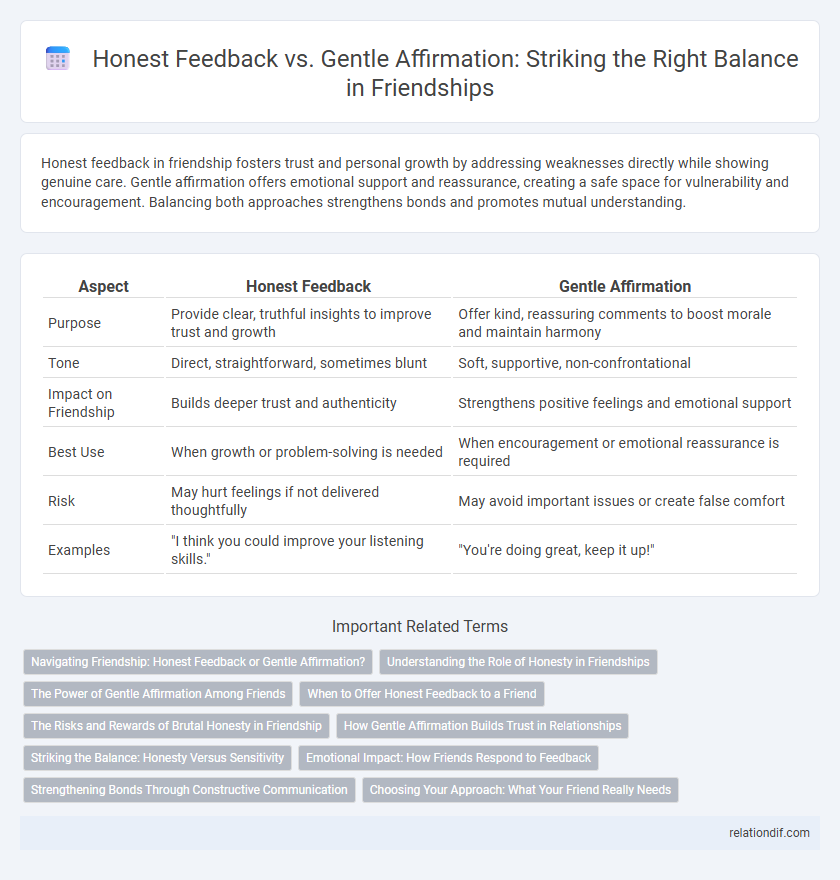Honest feedback in friendship fosters trust and personal growth by addressing weaknesses directly while showing genuine care. Gentle affirmation offers emotional support and reassurance, creating a safe space for vulnerability and encouragement. Balancing both approaches strengthens bonds and promotes mutual understanding.
Table of Comparison
| Aspect | Honest Feedback | Gentle Affirmation |
|---|---|---|
| Purpose | Provide clear, truthful insights to improve trust and growth | Offer kind, reassuring comments to boost morale and maintain harmony |
| Tone | Direct, straightforward, sometimes blunt | Soft, supportive, non-confrontational |
| Impact on Friendship | Builds deeper trust and authenticity | Strengthens positive feelings and emotional support |
| Best Use | When growth or problem-solving is needed | When encouragement or emotional reassurance is required |
| Risk | May hurt feelings if not delivered thoughtfully | May avoid important issues or create false comfort |
| Examples | "I think you could improve your listening skills." | "You're doing great, keep it up!" |
Navigating Friendship: Honest Feedback or Gentle Affirmation?
Navigating friendship requires balancing honest feedback and gentle affirmation to foster growth and trust. Honest feedback promotes self-awareness and helps address issues directly, while gentle affirmation reinforces positive behavior and emotional support. Striking the right balance strengthens connections and encourages authentic communication within the friendship.
Understanding the Role of Honesty in Friendships
Honesty in friendships cultivates trust by providing sincere feedback that fosters personal growth and mutual respect. Genuine communication helps friends navigate challenges with clarity while strengthening emotional bonds. Balancing honest feedback with gentle affirmation ensures that the truth is shared compassionately, preserving the friendship's integrity.
The Power of Gentle Affirmation Among Friends
Gentle affirmation among friends nurtures trust and emotional safety, allowing individuals to feel valued without fear of judgment. This supportive communication strengthens bonds by encouraging vulnerability and self-expression while maintaining respect for personal boundaries. Prioritizing kind, affirming feedback fosters a positive environment where growth and understanding flourish naturally.
When to Offer Honest Feedback to a Friend
Offer honest feedback to a friend when their actions significantly impact their well-being or important relationships, ensuring your input aims to support growth and prevent harm. Pay attention to moments of vulnerability or when they explicitly seek advice, as these indicate openness to constructive criticism. Prioritize honesty over comfort when withholding the truth could lead to misunderstandings or missed opportunities for personal development.
The Risks and Rewards of Brutal Honesty in Friendship
Brutal honesty in friendship carries the risk of damaging trust and causing emotional hurt, yet it can foster deep authenticity and personal growth by addressing issues directly. Honest feedback promotes clarity and real understanding, while gentle affirmation often preserves feelings but may obscure underlying problems. Balancing candid communication with empathy enhances relational resilience and mutual respect.
How Gentle Affirmation Builds Trust in Relationships
Gentle affirmation fosters trust in relationships by providing supportive, non-judgmental feedback that encourages openness and vulnerability. It validates feelings and experiences, creating a safe space where friends feel valued and understood. This nurturing approach strengthens emotional bonds and promotes ongoing honest communication.
Striking the Balance: Honesty Versus Sensitivity
Striking the balance between honest feedback and gentle affirmation in friendship fosters trust and growth while preserving emotional safety. Honest feedback provides clarity and constructive criticism essential for personal development, whereas gentle affirmation reinforces confidence and emotional support. Prioritizing a mix tailored to individual sensitivity levels strengthens bonds and encourages authentic communication.
Emotional Impact: How Friends Respond to Feedback
Honest feedback from friends fosters trust and promotes personal growth by addressing issues directly and encouraging self-awareness. Gentle affirmation, while soothing, helps maintain emotional safety and reinforces positive self-esteem, especially during vulnerable moments. Balancing candid critiques with empathetic support strengthens friendships by validating feelings and facilitating meaningful change.
Strengthening Bonds Through Constructive Communication
Honest feedback fosters trust and deepens friendship by promoting genuine understanding and growth, while gentle affirmation nurtures emotional safety and encouragement. Balancing candid insights with empathetic support strengthens bonds through constructive communication, enabling friends to navigate challenges with mutual respect. Effective dialogue that combines clarity and kindness cultivates resilience and lasting connection in friendships.
Choosing Your Approach: What Your Friend Really Needs
Honest feedback fosters trust by addressing your friend's growth areas directly, while gentle affirmation nurtures their confidence and emotional well-being. Assess the situation carefully, considering your friend's personality and current emotional state to decide whether they need constructive criticism or supportive encouragement. Tailoring your approach to what your friend truly needs strengthens your bond and promotes meaningful, balanced communication.
honest feedback vs gentle affirmation Infographic

 relationdif.com
relationdif.com